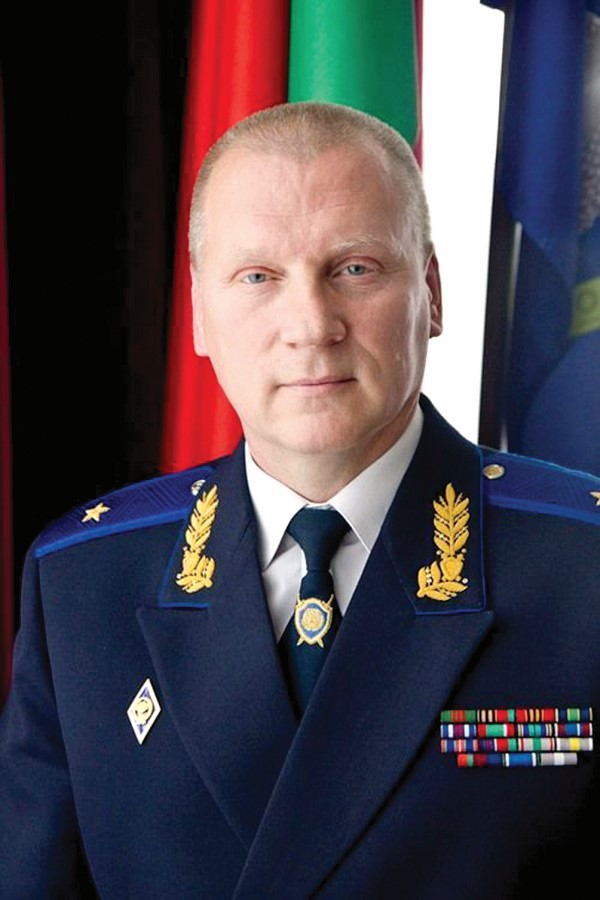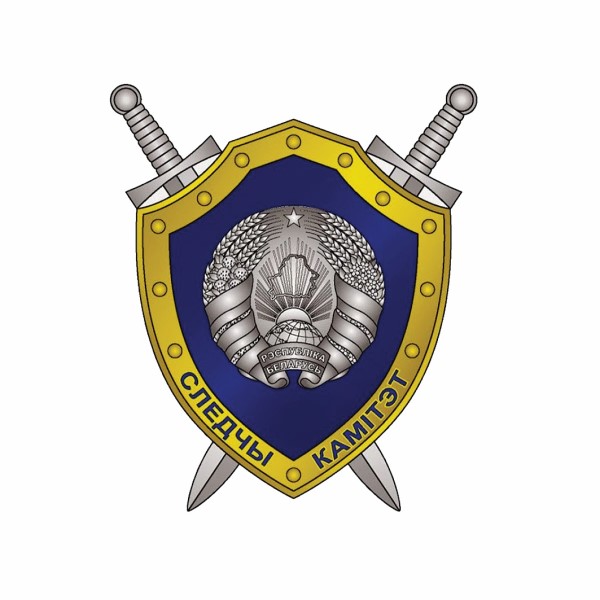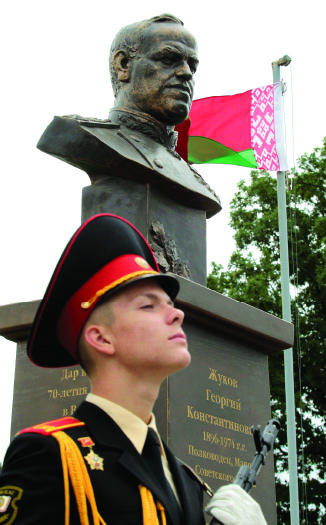 |
| The Chairman of the Investigative Committee,
Valentin Shaev |
Several years have passed since the Investigative Committee began its work. It was the first law-enforcement structure to be created in independent Belarus and to have retained its original format (other state bodies inherited from Soviet times having been largely reformed). What has it achieved over the years?
The decision to integrate all the country’s investigative subdivisions was accepted four years ago: on August 2nd, 2011, at a meeting directed by the President, to improve the system of preliminary investigation. Decree #409, ‘On Forming the Investigative Committee of Belarus’, was signed by the President on September 12th.
We can say confidently that the state and its citizens have no regrets concerning the creation of such a law-enforcement structure: the decision was right and timely. The most important thing is that it has allowed us to strengthen and protect the rights and legitimate interests of citizens in pre-trial criminal proceedings. It has given the chance to eliminate duplication of effort by law enforcement bodies and has helped optimise budgetary expenses. Positive results of investigatory work prove that the decision to make pre-trial investigation independent was correct.
We might call the Investigative Committee the grandest state project of the past five years. It is unique worldwide and has been created in such a short space of time.
Why was it created?
Preliminary investigation used to be carried out by investigators from the General Prosecutor’s Office, by bodies of internal affairs, by state security, and by financial investigations. They acted within a liaising structure but each felt to be an independent entity. I considered myself to be foremost an investigator and only then a prosecutor, as did many of my colleagues.
Departments had various approaches to the practical application of criminal legislation and the idea of reform for the system of preliminary investigation had come up before. There had been two attempts to create a truly uniform investigative body: in the late 1980s and 1990s, but attempts failed, due to individual departmental interests. Owing to various circumstances, ‘uniform preliminary investigation’ was never realised.
In truth, the quality of investigation left much to be desired, as the President notes. Two thirds of verdicts were ‘not guilty’, as investigators failed to fulfil their duties properly. There were cases of outright falsification of materials. Sometimes, innocent people were imprisoned and real criminals avoided punishment. It ruined lives! In such a situation, how can we call it justice?
In 2011, various opinions came to the fore: including statements on the overly large number of personnel employed, and the poor quality of investigation during the transition period. The President showed political will and determination in creating an independent investigation body. Just taking that decision had a positive effect.
Specific targets were set, with the Investigative Committee launching fully on January 1st, 2012. It wasn’t reform for its own sake, noted the Head of State. In a short space of time (just three months) there were significant improvements: a new legislative framework and employees, as well as equipment.
Huge state resources were concentrated on solving intellectual, political, financial and organisational issues. Within the first year of existence, more than 300 normative acts were passed, regulating all aspects of our work. Among these was a law ‘On the Investigative Committee of Belarus’.
Just imagine the intensity of work! Without a pilot period, the Investigating Committee began its work in full on January 1st, 2012. The first case under scrutiny was the murder of Yulia Lyashuk, testing our professionalism. It soon became apparent that our quality of work was as it should be.
Various models of investigation are possible, so how did you choose this one?
We used experience from other countries but, in many respects, we were breaking new ground. Without going into detail, Kazakhstan tried a similar model of crime investigation but abandoned it in 2013. Armenia also took steps to create a uniform independent investigative body, passing a corresponding law in 2014, but it has many problems still to be solved: in particular, concerning the interaction of law enforcement bodies. Most of the countries within the post-Soviet territory haven’t even tried to carry out such reform.
Russian experience was useful. Since 2007, it has had its own Investigative Committee under the General Prosecutor’s Office. However, it needs greater division of duty between the Prosecutor’s Office and the preliminary investigation body. Our Investigative Committee was created as an independent body, subordinate only to the President.
Our colleagues from Russia undertake and investigate about 10 percent of criminal cases, while the Russian Ministry of Internal Affairs of Russia takes care of other basic investigations. The Investigating Committee of Belarus investigates 99.9 percent of all criminal cases. The State Security Committee of the Republic of Belarus works on the others.
All those visiting our country are surprised by how orderly and safe it is. They say: “In your country, you can walk calmly day and night!” Is this to the merit of the Investigative Committee?
 The crime rate was growing until 2005 but, since 2006, we’ve seen a fall in the number of crimes. The most significant fall occurred in 2012: of 22.7 percent!
The crime rate was growing until 2005 but, since 2006, we’ve seen a fall in the number of crimes. The most significant fall occurred in 2012: of 22.7 percent!
This proves that systemic, purposeful measures are being taken to protect citizens, their rights and legal interests. These measures are yielding fruit. We can’t lay a fall in the crime rate or number of murders at the feet of one organisation alone, since the whole law-enforcement system is co-ordinated, organised at the highest level of interaction.
The Investigative Committee plays a significant role in developing the state and society, promoting law and order. I will repeat: it is a unique and successful body.
Earlier, you spoke about productivity. Can you give us an example?
It’s best to speak of positive trends. The organisational and practical measures taken by the Investigative Committee are improving the quality of preliminary investigation, which is increasing the percentage of criminal cases being solved (now almost 70 percent: up 10 percent on 2011). These measures are also reducing the national crime rate. Almost every murder is solved: the current indicator is 97.5 percent: one of the best in Europe. The same is true for rape and aggravated assaults, including those causing death.
Compared with crime detection in Western Europe, our country solves 15 percent more crimes, on average.
In ‘guaranteeing’ punishment and increasing the quality of investigation, we are reducing the number of criminals wanted by the police, and the number of missing persons. Investigators have reduced the number of unidentified bodies by more than 12 percent (since 2011).
Speaking of wanted criminals, their number has reduced by almost a quarter since 2011. In catching criminals quickly, it’s a disincentive for others to pursue the same path. Investigators are entrusted with carrying out preventive measures within the limits of the law, discovering why a crime has been committed and making suggestions on how to tackle such crimes. Ultimately, we aim to discourage crimes from being committed.
If your neighbour is called in for questioning, being suspected of having committed a crime, and the guilty person is then punished to the fullest extent of the law, it provides an example. Everyone who lives nearby will know of what’s happened and will see that the law is an active force, with which to be reckoned.
In raising the quality of investigation, we must mention paying compensation for damages during the course of an investigation, since the figure has grown by almost 10 percent. It’s an amount significant for victims and the state as a whole. Victims of crime approach us for help and are recompensed with property owned by criminals (approximately 125 percent of the value of what has been lost).
Reducing time spent on investigations is also vital, while maintaining quality. From the point of view of the victim, the faster the criminal case is investigated, the quicker the guilty person is found and compensation is awarded. The victim’s legitimate rights will be restored. Meanwhile, those under investigation must endure gossip and uncertainty, as must their family members. They want a fast resolution, to end the torment, and to be able to move on with their lives.
 |
| On the eve of the 4th anniversary of creation
of the Investigative Committee in Belarus, the heads of investigative committees of Belarus and Russia unveiled the monument to marshal Georgy Zhukov at historical and cultural complex “Stalin Line”, and also more than 150 members of these investigative committees took the oath |
In the first half of 2015, the number of criminal cases investigated in a single month doubled in comparison with 2011. We close about 40 percent of criminal cases within this time, while the rest take longer.
In toughening our requirements of investigation and weighing evidence carefully, we’ve reduced the number of criminal cases coming up for appeal and additional investigation.
In 2011, there were 917 criminal cases, against 216 in 2014: a fourfold reduction. Our priority is to reduce this further if we can. A verdict of not guilty was passed against 333 defendants in 2011. Since the Investigative Committee began its work, this has reduced to 98 people.
In protecting the rights of citizens and their legitimate interests, we’ve ensured that the greatest amount of evidence is gathered. We believe that no one should be found criminally liable without sufficient proof! At various times, investigators have returned up to a fourth of materials (because of inadequate criminal evidence) and have even returned a half to some other structures. Since it began its work, the Investigative Committee has returned over 35,000 materials to inquiry bodies.
Criminal proceedings are not always pursued to a final conclusion if evidence is lacking. In 2012, over half of cases were ‘thrown out’ for this reason. This is an indicator of our meticulous attention to detail and does not reflect poorly on the law-enforcement system of the country.
You mentioned that investigators seek to find motivation for crimes, so that this can be remedied in future. Tell us more.
The law directly entrusts investigators with finding reasons for crimes being committed, so that suggestions can be made to prevent further occurrence. In the first half of the year, we receive feedback in this respect from various bodies and organisations: on every third case. Moreover, in excess of 3,500 cases of feedback and suggestions are submitted by investigators personally, for example, via meetings and sessions.
Since launching, the Investigative Committee has submitted more than 122,000 conceptions, resulting in measures being taken with 9,384 officials: more than 500 have been dismissed.
Where negative trends and situations become apparent, we pursue the question with the relevant authorities. From June to July this year, we sent two letters to the Government to suggest the immediate adoption of measures to ensure safety of children’s play equipment and general security at such sites. Analysing criminal fraud cases in January of this year alone, we sent letters to the National Bank, the Ministry of Taxes and Duties, and the General Prosecutor’s Office.
Your department actively participates in law-making.
In investigating criminal cases, our investigators often reveal gaps in legislation. One such case, on surrogate maternity, revealed inefficient control over the process, so we prepared a number of proposals for Government.
Despite being one of the youngest law-enforcement departments, the Investigating Committee has taken essential steps in shaping legislation, producing initiatives now embodied in regulatory acts. Some of our suggestions are now included in the law ‘On Fighting Corruption’, signed by the Head of State.
Presidential Decree #6 ‘On Urgent Measures to Counteract Illicit Drug Trafficking’ contains detailed measures on toughening responsibility for sale and use of drugs, including reducing the age of criminal liability for drug trafficking (from 16 to 14 years). Our Plea bargaining is another new addition to national legislation, whereby a criminal can negotiate to reduce their sentence in return for giving information resulting in other prosecutions.
How many investigators were there before the creation of the Committee?
We have a quarter fewer now; we chose by level of professionalism. Over the past year, personnel have been restricted across 37 regional and city departments, following careful analysis of workloads. Some have been reorganised into inter-district and united city departments: in Vitebsk, Gomel, Baranovichi, Brest, Pinsk, Orsha, Bobruisk, Grodno, Mogilev and Polotsk.
This has enabled savings to be made in the cost of running buildings and vehicles. In fact, 16 regional departments have been reduced in size, allowing us to optimise our structure, and keep only the best-qualified personnel. Seventy staff members have been let go from the central office of the Investigative Committee, from the departments of the Investigating Committee in the regions and Minsk, and from regional, city and district departments of the Investigative Committee.
In the near future, another 120 staff are to be let go: mainly executive personnel and those in ‘rear’ services. This aims to save money while improving quality and an efficient approach. In saving funds, these can be directed towards other social programmes.
There’s always a human factor and risk of error. How do we ensure that such mistakes are kept to the minimum? Do investigators work in teams, with someone to oversee conduct?
Like many readers, you’re interested in corruption. My position is to be principled and strict, aiming to eliminate the problem. Last year, I began criminal proceedings against subordinates who, for the sake of fleeting profit, forgot the meaning of such words as ‘law’, ‘justice’ and ‘Fatherland’. Some have now been condemned...
The system operating within the Committee aims to exclude error. We are guided by circumstances. Young investigators are partnered with more experienced, and those with more experience are charged with the most difficult, intricate cases.
Investigative teams are created where necessary and there is an internal procedural division, which has the power to override certain decisions. Independent investigation does not mean uncontrolled.
The General Prosecutor’s Office plays a supervising role and the court makes final decisions on guilt.
Tell us about your international co-operation.
The international arena already knows us as a reliable and competent partner, capable of rendering legal assistance quickly and well. We’ve developed constructive interaction not only with law enforcement bodies across the CIS (such as the Investigative Committee of the Russian Federation, the Investigative Department of the Ministry of Internal Affairs of Russia, and the Ministry of Internal Affairs of Kazakhstan) but with colleagues from other states.
Just recently, we met representatives of the Federal Criminal Police Office of Germany, making arrangements for mutual legal assistance with Pakistan. Our professionalism in counteracting transnational cybercrime is recognised by the world financial community. Visa Company has praised our exposure of a number of crimes regarding payment cards, committed outside our country and within.
In 2014, we rendered our first legal assistance to law enforcement bodies across 16 states, and addressed requests from 61 countries. We directed materials to extradite 186 accused persons, and arrested persons outside of Belarus.
Our employees, as part of Belarusian delegations, have participated in various foreign conferences, forums and consultations, on a wide spectrum of law-enforcement themes: cybercrime, counteracting human trafficking and money-laundering.
Where are investigators trained?
Most of those currently employed are the same investigators who served in law-enforcement bodies, state security, financial investigations, and the General Prosecutor’s Office previously. They know their work well, being professionals. We haven’t yet raised a new generation but we’ll be working to do so at the Academy of the Ministry of Internal Affairs. We employ law graduates from our universities and a new speciality was launched for our department at the Academy of Public Administration (under the aegis of the President of the Republic of Belarus) in 2013-2014.
Afterword
In conclusion, the Major General of Justice, Valentin Shaev, underlined, “Speaking of our activity, I can say that we, with steady firmness, have put into practice the requirements of the Head of State regarding priority tasks for the Investigating Committee. Observing the law, and protecting the interests of citizens and the state, we aim to ensure that no innocent person is arrested and condemned, while crimes are exposed and investigated quickly and professionally.”
From the author
The creation of the Investigative Committee of Belarus raised much debate. However, the Head of State’s decision to create an independent department of preliminary investigation has been a real breakthrough for the legal system of Belarus, bringing a new level of rigour. This protection of the rights and freedoms of citizens serves the interests of citizens, wider society and the state.
Alexander Lukashenko, before handing the banner to the Committee, formulated tasks to be solved, saying, “The life and health of people are proclaimed as supreme values in our country: the basis of national safety. Law-enforcement plays the lead role in accomplishing this mission. To increase its efficiency, it has been decided to create a uniform, independent body of preliminary investigation: the Investigative Committee.”
By Victor Ponomarev











